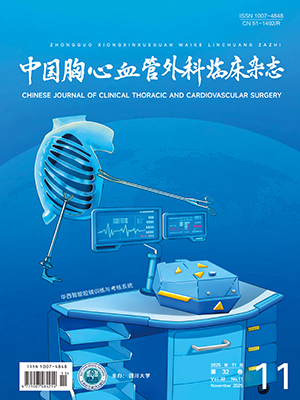| 1. |
Bray F, Laversanne M, Sung H, et al. Global cancer statistics 2022: GLOBOCAN estimates of incidence and mortality worldwide for 36 cancers in 185 countries. CA Cancer J Clin, 2024, 74(3): 229-263.
|
| 2. |
Cao W, Chen HD, Yu YW, et al. Changing profiles of cancer burden worldwide and in China: A secondary analysis of the global cancer statistics 2020. Chin Med J (Engl), 2021, 134(7): 783-791.
|
| 3. |
Barbat JH. Thoracic esophagectomy: Report of a case. Cal State J Med, 1913, 11(6): 225-227.
|
| 4. |
Liu H, Jin D, Wang Q, et al. Perioperative safety and short-term efficacy of functional minimally invasive esophagectomy. J Int Med Res, 2021, 49(5): 3000605211010081.
|
| 5. |
Liu W, Guo X, Zhao H, et al. Mediastinoscopy-assisted transhiatal esophagectomy versus thoraco-laparoscopic esophagectomy for esophageal cancer: A single-center initial experience. J Thorac Dis, 2020, 12(9): 4908-4914.
|
| 6. |
Rezaei R, Masuom SHF, Soroush N, et al. Comparison of transhiatal esophagectomy using a mediastinoscope with transhiatal esophagectomy by the classic method. Asian Cardiovasc Thorac Ann, 2021, 29(1): 33-37.
|
| 7. |
李金蔓. 食管癌术后并发症分级及其影响因素分析. 中国胸心血管外科临床杂志, 2017, 24(4): 259-264.Li JM. Clavien-Dindo classification of postoperative complications and its influencing factorsin patients receiving esophagectomy. Chin J Clin Thorac Cardiovasc Surg, 2017, 24(4): 259-264.
|
| 8. |
Mboumi IW, Reddy S, Lidor AO. Complications after esophagectomy. Surg Clin North Am, 2019, 99(3): 501-510.
|
| 9. |
Aoyama T, Kazama K, Atsumi Y, et al. Clinical influence of anastomotic leakage on esophageal cancer survival and recurrence. Anticancer Res, 2020, 40(1): 443-449.
|
| 10. |
Vrba R, Kučová P, Ľubušká L, et al. Bacterial complications in surgical management of esophageal cancer. Klin Mikrobiol Infekc Lek, 2021, 27(3): 93-97.
|
| 11. |
Murthy RA, Clarke NS, Kernstine KH. Minimally invasive and robotic esophagectomy: A review. Innovations (Phila), 2018, 13(6): 391-403.
|
| 12. |
Kanekiyo S, Takeda S, Tsutsui M, et al. Low invasiveness of thoracoscopic esophagectomy in the prone position for esophageal cancer: A propensity score-matched comparison of operative approaches between thoracoscopic and open esophagectomy. Surg Endosc, 2018, 32(4): 1945-1953.
|
| 13. |
Gottlieb-Vedi E, Kauppila JH, Malietzis G, et al. Long-term survival in esophageal cancer after minimally invasive compared to open esophagectomy: A systematic review and meta-analysis. Ann Surg, 2019, 270(6): 1005-1017.
|
| 14. |
Zheng Y, Li Y, Liu X, et al. Minimally invasive versus open mckeown for patients with esophageal cancer: A retrospective study. Ann Surg Oncol, 2021, 28(11): 6329-6336.
|
| 15. |
Bumm R, Hölscher AH, Feussner H, et al. Endodissection of the thoracic esophagus. Technique and clinical results in transhiatal esophagectomy. Ann Surg, 1993, 218(1): 97-104.
|
| 16. |
Guo L, Zhao Q, Wang K, et al. A case-control study on the therapeutic effect of mediastinoscope-assisted and thoracoscope-assisted esophagectomy. Surg Innov, 2021, 28(3): 316-322.
|
| 17. |
Feng MX, Wang H, Zhang Y, et al. Minimally invasive esophagectomy for esophageal squamous cell carcinoma: A case-control study of thoracoscope versus mediastinoscope assistance. Surg Endosc, 2012, 26(6): 1573-1578.
|
| 18. |
Aoyama J, Kawakubo H, Mayanagi S, et al. Discrepancy between the clinical and final pathological findings of lymph node metastasis in superficial esophageal cancer. Ann Surg Oncol, 2019, 26(9): 2874-2881.
|
| 19. |
Zheng YZ, Li XQ, Wang JY, et al. Impact of examined lymph node count for esophageal squamous cell carcinoma in patients who underwent right transthoracic esophagectomy. Ann Surg Oncol, 2021, 28(6): 3025-3033.
|
| 20. |
Yu L, Zhang XT, Guan SH, et al. The number of negative lymph nodes is positively associated with survival in esophageal squamous cell carcinoma patients in China. Open Med (Wars), 2020, 15: 152-159.
|
| 21. |
Lord JM, Midwinter MJ, Chen YF, et al. The systemic immune response to trauma: An overview of pathophysiology and treatment. Lancet, 2014, 384(9952): 1455-1465.
|
| 22. |
Biere SS, van Berge Henegouwen MI, Maas KW, et al. Minimally invasive versus open oesophagectomy for patients with oesophageal cancer: A multicentre, open-label, randomised controlled trial. Lancet, 2012, 379(9829): 1887-1892.
|
| 23. |
Fabian T. Management of postoperative complications after esophageal resection. Surg Clin North Am, 2021, 101(3): 525-539.
|
| 24. |
Verstegen MHP, Bouwense SAW, van Workum F, et al. Management of intrathoracic and cervical anastomotic leakage after esophagectomy for esophageal cancer: A systematic review. World J Emerg Surg, 2019, 14: 17.
|




